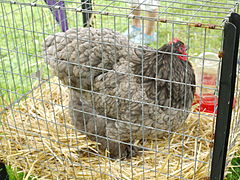Cochin chicken
 Partridge Cochin cock | |
| Conservation status |
|
|---|---|
| Country of origin | China |
| Use | ornamental |
| Traits | |
| Weight | |
| Egg colour | brown |
| Comb type | single |
| Classification | |
| APA | Asiatic[5]: 12 |
| ABA | Feather legged[5]: 8 |
| EE | yes[6] |
| PCGB | Soft feather: heavy[7] |
| |
The Cochin is a breed of large domestic chicken. It derives from large feather-legged chickens brought from China to Europe and North America in the 1840s and 1850s. It is reared principally for exhibition. It was formerly known as Cochin-China.
History
Like the Brahma, the Cochin derives from very large feather-legged chickens brought from China to Europe and North America in the 1840s and 1850s. These were at first known as "Shanghai" birds, and later as "Cochin-Chinas".[3]: 89 The large size and striking appearance of these birds contributed to a sudden large increase of interest in poultry-breeding in Western countries, sometimes described as "hen fever".[8][9]
The Cochin was included in the first edition of the Standard of Excellence in Exhibition Poultry, prepared by William Bernhardt Tegetmeier for the first Poultry Club of Great Britain in 1865. The colours described are buff, black, cinnamon, grouse, lemon, partridge, silver buff, silver cinnamon, and white.[10]: 5–12 Bantam Cochins were not listed.[10]: 4
The Cochin, both full-sized and bantam, was included in the first edition of the Standard of Excellence of the American Poultry Association in 1874.[8][5] The original colours were white, partridge, buff and black; other colours were later added.[5]
Characteristics
The most distinctive feature of the Cochin is the excessive plumage that covers leg and foot. The skin beneath the feathers is yellow.
In the United Kingdom the recognised colour varieties, for large fowl only, are black, blue, buff, cuckoo, partridge and grouse, and white;[3]: 90–93 Cochin bantams are not recognised by the Poultry Club of Great Britain.[3]: 89 The Entente Européenne lists the same nine colours for full-sized Cochins, and twenty-four for the bantam; any of the bantam varieties may be frizzled, with the feathers curling outwards.[6] The American Poultry Association recognises nine colours for the full-sized bird – barred, black, blue, brown, buff, golden-laced, partridge, silver-laced, and white; the same colours are recognised for the bantam, with the addition of four more: birchen, Columbian, mottled, and red.[5]
Use
The Cochin has been bred principally for exhibition, at the expense of productive characteristics.[3]: 89 It is a good layer of very large tinted eggs, and lays well in winter.[3]: 89 [8] The hens are good sitters and good mothers, and may be used to hatch the eggs of turkeys and ducks.[8] The meat tends to be coarse in texture and excessively dark; capons slaughtered at an age of 12–16 months provide a good large table bird.[8]
Gallery
-
Head
-
Blue Cochin hen
-
Cochin cock
References
- ^ Barbara Rischkowsky, D. Pilling (eds.) (2007). List of breeds documented in the Global Databank for Animal Genetic Resources, annex to The State of the World's Animal Genetic Resources for Food and Agriculture. Rome: Food and Agriculture Organization of the United Nations. ISBN 9789251057629. Accessed January 2017.
- ^ Heritage Poultry Breeds: Chickens. Pittsboro, North Carolina: The Livestock Conservancy. Accessed July 2020.
- ^ a b c d e f g Victoria Roberts (2008). British poultry standards: complete specifications and judging points of all standardized breeds and varieties of poultry as compiled by the specialist breed clubs and recognised by the Poultry Club of Great Britain. Oxford: Blackwell. ISBN 9781405156424.
- ^ a b Carol Ekarius (2007). Storey's Illustrated Guide to Poultry Breeds. North Adams, Massachusetts: Storey Publishing. ISBN 9781580176675.
- ^ a b c d e APA Recognized Breeds and Varieties: As of January 1, 2012. American Poultry Association. Archived 4 November 2017.
- ^ a b Liste des races et variétés homologuée dans les pays EE (28.04.2013). Entente Européenne d’Aviculture et de Cuniculture. Archived 16 June 2013.
- ^ Breed Classification. Poultry Club of Great Britain. Archived 12 June 2018.
- ^ a b c d e Cochin Chicken The Livestock Conservancy. Archived 3 October 2016.
- ^ Smith, Page; Charles Daniels (2000). The Chicken Book. University of Georgia Press. ISBN 978-0-8203-2213-1.
- ^ a b William Bernhard Tegetmeier (editor) (1865). The Standard of Excellence in Exhibition Poultry, authorized by the Poultry Club. London: Groombridge and Sons, for the Poultry Club.



